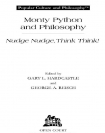Monty Python and Philosophy Gary Hardcastle (mystery books to read txt) 📖

- Author: Gary Hardcastle
Book online «Monty Python and Philosophy Gary Hardcastle (mystery books to read txt) 📖». Author Gary Hardcastle
The joke here is the vast cultural distance between the refined, polite Michael Baldwin and his new fascist-philosopher colleagues. But the sketch is not merely whimsical. It involves kernels of historical truth about the institution of philosophy which, for all its lofty ideals and intellectual refinements, has been affected by these baser social forces and prejudices that animate the Bruces. In the 1970s, for example, many philosophers were scandalized to learn about Martin Heidegger’s professional, party-sponsored ascent in Nazi Germany. Others were upset by allegations about Wittgenstein’s homosexuality and his mistreatment of persons and colleagues he did not like.111 Recent studies have focused less on individuals and more on how curricula and pedagogy in philosophy were affected by anticommunism (or McCarthyism) in the United States and Europe during the cold war. Politically engaged styles or programs of philosophical activity and research that once dominated philosophy in the 1920s and 1930s—Marxism, most prominently—fell into disfavor and survived, at best, as niche specialties. 112
The point is not that the Pythons anticipated these historical claims or investigations. Their sketch simply finds humor in the idea that philosophers, regardless of how accomplished or obscure, are nonetheless human and therefore susceptible to human foibles—be they the allure of nationalism or the joys of putting whoopee cushions in colleagues’ chairs (as Sartre, the Pythons elsewhere tell us, was fond of doing).
Yet the humor leads us back to our critique. If the Pythons had in mind a real-world model for the Bruces, who could it have been but Wittgenstein and his followers at Cambridge and Oxford (where the Pythons began their careers)? Wittgenstein’s personal magnetism was legendary and helped cement nothing less than a tribal or cult mentality among his students. Critics may have described things in extreme terms, but they are surprisingly consistent. Cambridge philosopher C.D. Broad, a contemporary of Wittgenstein, complained in print about “the philosophical gambols of my younger friends as they dance to the highly syncopated pipings of Herr Wittgenstein’s flute” while Russell disdained the “cult of ‘common usage’” that grew up around Wittgenstein. Two recent historians note that this “passionately expressed allegiance to Wittgenstein” extended beyond philosophy into habits of lifestyle, dress, and diet. “How religiously the inner circle of the disciples followed the master has a comical air to it: sleeping in narrow beds, wearing sneakers, carrying vegetables in string bags to let them breathe, and putting celery in water when serving it for dinner. . . .”113
None of Wittgenstein’s devotees changed his or her name to Bruce, so far as I know. But that is beside the point. The important question this historical research raises is whether social and political circumstances affect philosophers as thinkers. Is technical philosophical work—the premises on which dominant theories rest, the subjects philosophers find interesting, the arguments they construct, and the seminar reading lists they create, for example—affected by the forces and politics of professionalism and social life? For the Old Bruces, the answer is clearly ‘yes.’ They will do nothing without the approval of their colleagues and fellow patriots. New Bruce, on the other hand, presents a challenge. Will he teach socialism and condemn it as “wrong” because he has been ordered to? The sketch does not answer but frames the question effectively: New Bruce must either give in to this departmental pressure or put up a fight.
A Knockout of an Argument
So it goes in the sketch, “The Epilogue: A Question of Belief.” Here, Cleese is the host of a high-brow intellectual television program called “The Epilogue” and his two guests are a world-renowned Bishop and a popular professor of philosophy at the University of East Anglia. Their topic is the perennial question, Does God exist? But tonight there is a twist. These two guests, Cleese explains, will employ a special method: they’re going to “fight for it—the existence or nonexistence of God is to be determined by two falls, two submissions, or a knockout.” Cleese transforms into a sports announcer (“Alright Boys. Let’s get to it!”) and the monsignor and philosopher begin tossing each other around the ring. As the sketch ends, there is yet no clear winner. Cleese tells the audience, “we’ll be bringing you the result of this discussion later on in the program.”114
This discussion? As with the Bruces, this sketch juxtaposes two very different things not only for the resulting laughs and silliness. Those laughs take some root in the suspicion that these two very different institutions, violent sport and serious intellectual debate, may be fundamentally connected or not so different. Both sketches suggest that philosophical questions and styles are sometimes like prizefights and effectively settled by the power wielded by individuals, departments, or societies and nations.
So understood, these two threads of commentary about philosophy that run throughout Monty Python’s Flying Circus—the parodies of ordinary language philosophy and the hardball politics involved in the life of the mind—come together in a one-two punch that lands squarely on Wittgenstein’s jaw. For if philosophers’ beliefs and arguments are to any extent influenced by fashions, politics, or overt bullying—whether of nations, professional academic departments, rival intellectuals, and so on—then it cannot be correct to say that philosophy consists exclusively in solving puzzles in everyday language. For in that case, what philosophers say and believe about philosophical subjects is affected by circumstances and pressures





Comments (0)